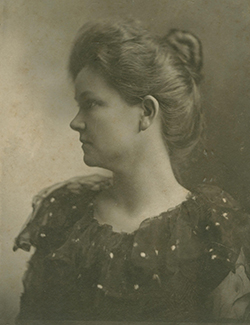When the doors of the State Normal and Industrial School (now UNCG) opened on October 5, 1892, for the first day of instruction, 176 women from across North Carolina arrived in Greensboro to attend. The number would grow to 223 by the year’s end. Many of the students who arrived were non-traditional students with previous degrees from other institutions. One was 26-year-old Minnie Lou Jamison from Rowan County, NC. She had attended a local academy in her home county and worked for a number of years teaching in order to save money for her tuition. In 1896, after graduation from State Normal, she remained on campus in a faculty position in the Department of Home Economics.
Jamison reflected President Charles Duncan McIver’s statement in the 1902 Annual Catalogue that the “State Normal and Industrial College stands for a public educational system that will educate all people.” The institution attracted about one-third of its enrollment in the early years from local “town students,” including one who commuted daily to class on horseback. A steady commitment to non-traditional students continued to grow.
This commitment can be seen in Margaret Rowlett (Class of 1925), who began working at the age of 14 in a North Carolina rag mill to earn money to support her education. She enrolled in the North Carolina College for Women (now UNCG) as a 25-year-old freshman. After graduation, she was able to pursue a career in writing and illustrating children’s books and creating textiles and draperies aimed at children.
During World War II, the college’s focus shifted to supporting the war effort. Spouses of many active military servicemen enrolled at Woman’s College (now UNCG) after the institution shifted its previous policy banning married students. Following the war, the enactment of the G.I. Bill affected higher education throughout the country, and Woman’s College was no exception. By 1946, 54 veterans of the women’s branches of the armed forces had enrolled at WC on the G.I. Bill.
One of these returning veterans was Reva Fortune of Greensboro, who served with the Army Air Force while in the Women’s Army Corps (WAC) from 1943 to 1948 and with the Women in the Air Force (WAF) from 1948 to 1952. In 1954 at the age of 37, she enrolled at Woman’s College on the G.I. Bill. She had long wanted to attend college, but noted that “before the War [she] did not have the means.” Fortune graduated in 1958 with a degree in biology and a minor in Spanish.
In the late 1950s, college administrators began to recognize a growing need for higher education for a group that was described as “special undergraduate students.” In a 1958 report, Chancellor Gordon Blackwell projected a steady increase in the number of adult students at WC, “from 40 in 1957 to 230 by 1970.” This growth did continue and, in the late 1960s, an Ad Hock Committee to Study Non-Traditional Students was formed. Following the committee’s recommendation, the first Office of Adult Students was created in 1972 to “recruit, admit, and monitor non-traditional students at UNCG.”
UNCG’s support for non-traditional students continues, with the UNCG Campus and Activities Program (CAP) coordinating many events and activities aimed at assisting adult and commuter students. Through these types of programs, UNCG continues to provide opportunities for students to learn, grow, and be active on campus.
By Erin Lawrimore

